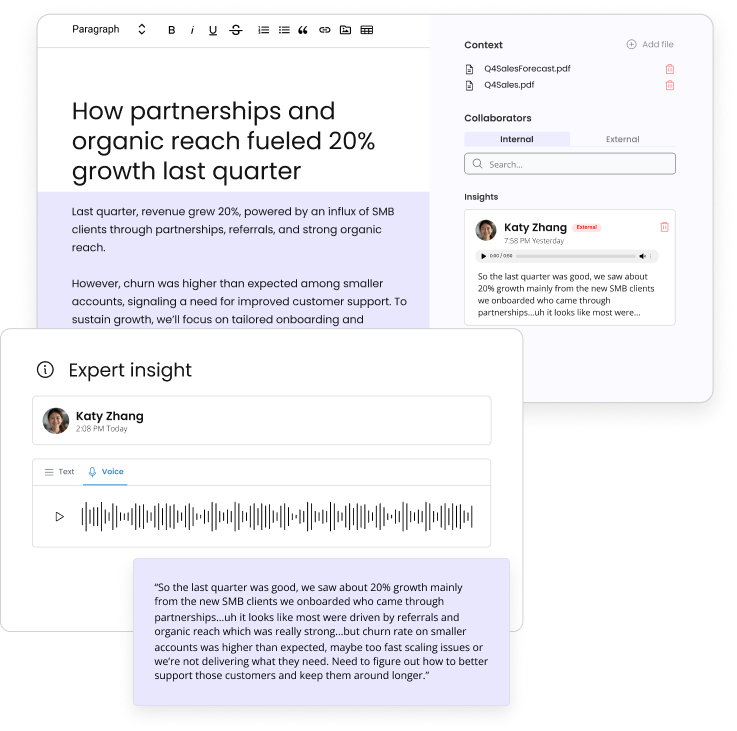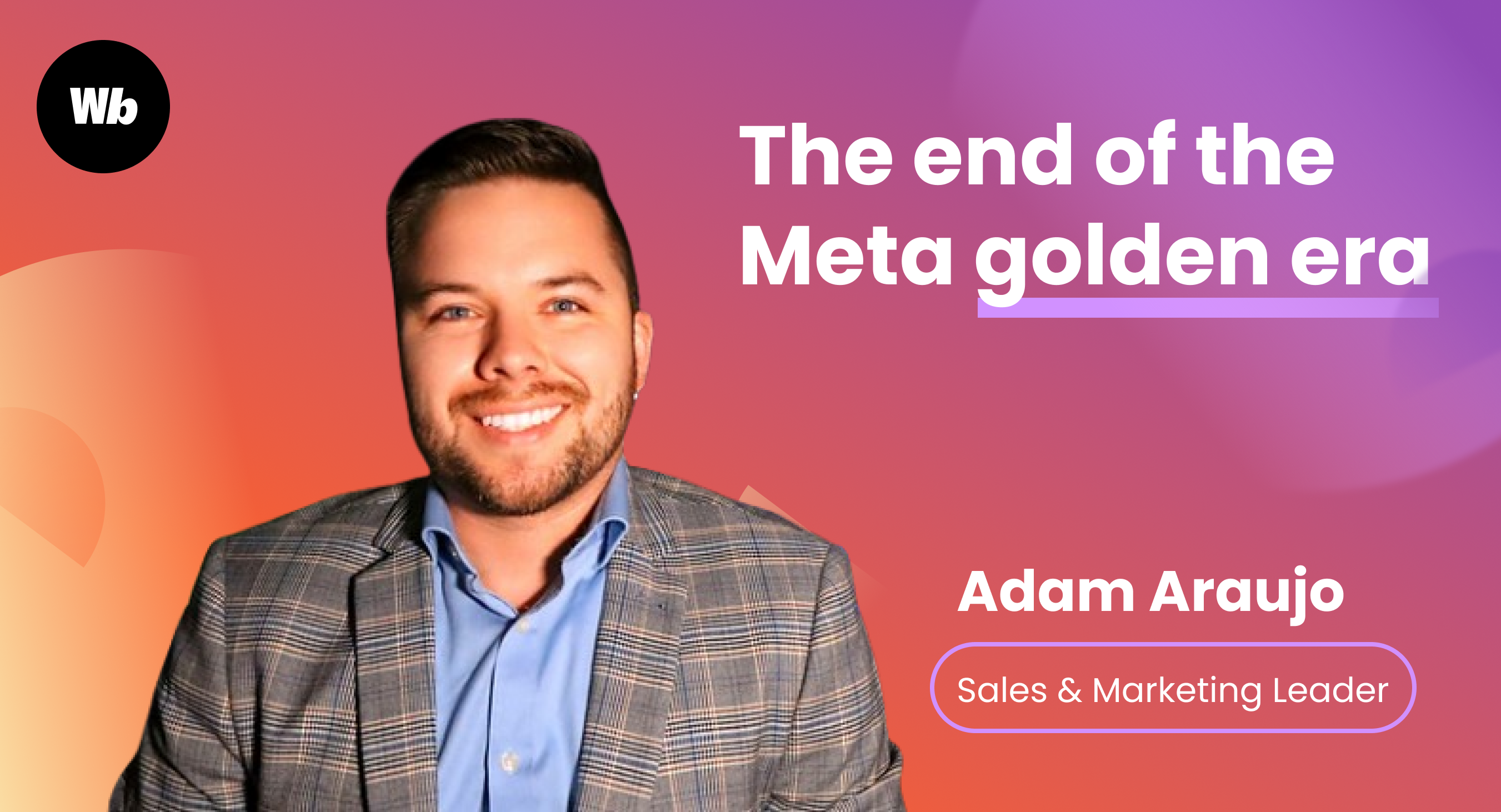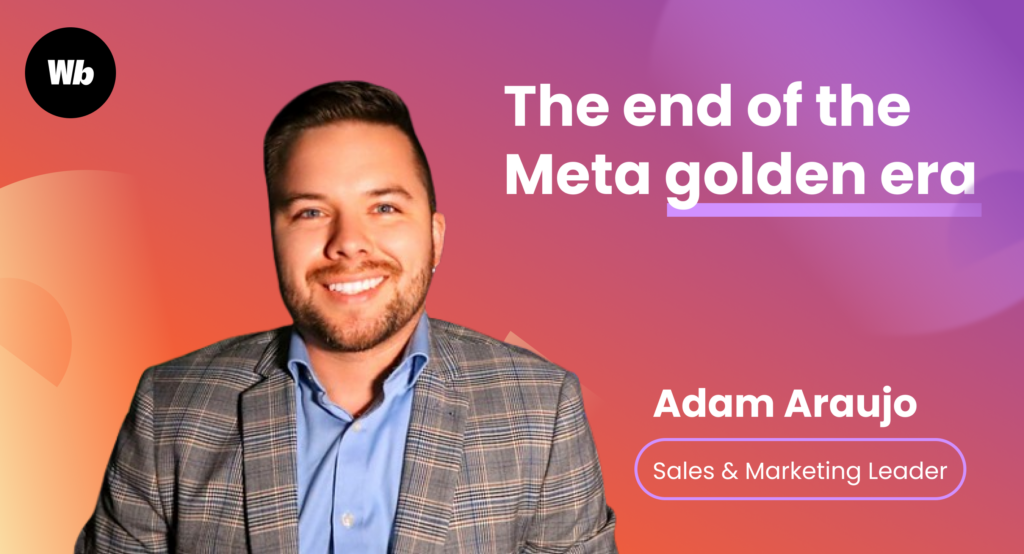Table of Contents

Authority scales when expertise comes first
Wordbrew helps teams collect expert insight before AI ever writes a word.
Built for expert-led, review-safe content
- Home
- »
- Superbrewed Insights
- »
- Data-Driven Decisions & The Decline of Meta Ads with Adam Araujo, Fractional CMO at CMO…
-
Christina Ballinger
- 5 minutes read time
Data-Driven Decisions & The Decline of Meta Ads with Adam Araujo, Fractional CMO at CMO Lift
- Home
- »
- Superbrewed Insights
- »
- Data-Driven Decisions & The Decline of Meta Ads with Adam Araujo, Fractional CMO at CMO…
Data-Driven Decisions & The Decline of Meta Ads with Adam Araujo, Fractional CMO at CMO Lift
Table of Contents

It’s an understatement to say social media has changed over the past 10 years, from a commercial (and indeed any) perspective.
Gone are the days of slapping a hazy filter on a pretty flatlay and expecting results. And with this shift comes a clearer understanding of what “results” actually look like.
Today’s marketing agencies are as focused on the data as they are on the perfect creative.
Ad performance is all about targeting the right people, in the right way, at the right time.
But with the goal posts always shifting, this is no easy task.
Few people know this better than Adam Araujo. Over the past seven years, he has harnessed his passion for data to help hundreds of businesses land local clients.
Adam sat down with our founder Georgia to educate aspiring marketers on:
- His approach to data-backed marketing,
- How to get results in the new Meta landscape,
- How data and AI will shape the future of marketing.
Highlights from our conversation:
- The end of the Meta golden era
- Nailing the basics: pay attention to the data
The end of the Meta golden era
Once upon a time, advertising through Meta felt like sending your dream client a DM. Now, Adam says, it’s more like a “really easy-to-use billboard.”
Ever-increasing data restrictions are making it harder to reach the very specific audience you want, leaving a lot down to guesswork, with a suffering return on ad spend as a result.
Here’s an example of Meta’s restrictions in action:
Adam cited an experience of running ads in Dallas. Though he wanted to target homeowners in the city, Meta requires you to cast a wider net.
This means including everyone who has been to the city. Your ad could easily end up on a tourist’s feed.
Imagine you’re a local real estate agent, dentist, or optician knowing right off the bat that you’re wasting your money showing your ad to people who’ve only been in town for the weekend?
“It doesn’t really make much sense, so our approach is all data driven.” says Adam. “We’ve built a large language model that actually has the ability to go in and directly target the people who have searched for someone’s service or product in the last 24 to 48 hours.”
It’s the perfect amalgamation of Adam’s two best pieces of advice for aspiring marketers in the current climate—“stay curious and be data-driven.”
Nailing the basics: pay attention to the data
If you’re opening a new business, or launching a new product, don’t skimp on your research.
You don’t just need the right product. You need it in the right place. And again, it’s all there in the data.
As Adam puts it: “if you just launched a rocket and you aimed it at the moon without data, you’re probably going to miss the mark.”
But the flipside is also true: “if you execute the brand, if you execute the messaging and you have a great offer and you combine all those together and you have data to support all of it and to target people, it’s amazing how fast it can go.”
Adam has seen both sides: The dentist who didn’t speak Spanish, but was opening a practice in an almost entirely Hispanic area?
It’s a prime example of where an oversight of basic data could have been catastrophic. But by tweaking the offer and messaging, they could turn things around really quickly. “Before he even opened, we fully booked him out for three weeks straight.”
As any founder or small business owner knows, you don’t always have all the data you want available.
Here’s how to work through it.
“If you don’t have data, casting a wide net and narrowing down after that would be the best fit,” says Adam. “But if you have the data, you can kind of skip all that.”
There’s no such thing as a bad product
Is there any product that a data-driven approach can’t rescue? If the product exists, Adam doesn’t believe so.
“I think a product exists because it serves a certain market. If you can identify that market, which a lot of people have problems doing, and you have great messaging behind it and you have a great offer, it really doesn’t matter what I think or what the person who owns the business thinks, as long as it serves that market that we’re advertising to, it’ll work.”
Take the example of a beachside food cart. You could have some pretty terrible, overpriced ice cream and still sell out. But you could also be selling the best hot chocolate in the world, and fail to sell a cup.
Something Adam sees far too much of is short-term thinking: Businesses focusing on getting the leads that will get them through the month, or to the next season, rather than building a solid foundation and looking forward.
Without this foundation, businesses are vulnerable to being targeted by lead agencies who over-promise on what they can deliver—something many of Adam’s clients are burned by before they come to him.
“They guarantee you a hundred appointments or your money back… And I’m sure there’s some long drawn out, small print that they don’t read and they end up signing up and it’s a repeating cycle. And I hear it every single day.” says Adam.
How data and AI will shape marketing
Unsurprisingly, as we look towards the future of marketing, Adam is adamant that as long as marketers follow the data, they can’t go far wrong.
Of course, this also means staying on the right side of new regulations.
“It was important back when Facebook started, and it’s still important today—but with all the new regulations with the FCC and the TCPA, there’s a lot of things that you have to make sure that your company abides by.”
Of course, we couldn’t let Adam go without getting his take on AI.
Having worked with plenty of small, local businesses, Adam believes many of them are missing out.
And once again, it all comes down to short-term thinking.
“There’s a lot of fear and uncertainty when it comes to AI. For example, AI calling is one of the things that we recommend. Many people heard about the law change that made them think AI calling is illegal. It’s not––you just have to make sure that your stuff is signed up for correctly. And a lot of companies just don’t take the time to do it because of short-term thinking.”
AI can help us level the playing field and give small business owners some time back. It’s up to marketers to understand how and when it can help us. This way, we can bridge the gap between the small and large companies.
Adam is hopeful and excited about the future of AI. But he still thinks there will be a place for human written content, and he can’t imagine a time when this won’t be the case.
“I think AI does a great job of piecing together kind of like a skeleton of what to expect. So for example, blogs or something along the lines of that. But there’s also got to be a human element too. And that’s a very complex thing to figure out. We don’t even know how our brain works, let alone how AI works.”
But at the end of the day: “we have to embrace change, right? Otherwise, we stagnate and we’re out of here.”
Want to publish content that speaks to your audience? Every piece Wordbrew creates is on-brand and edited by subject matter experts, so your content never misses the mark. Sign up today.
